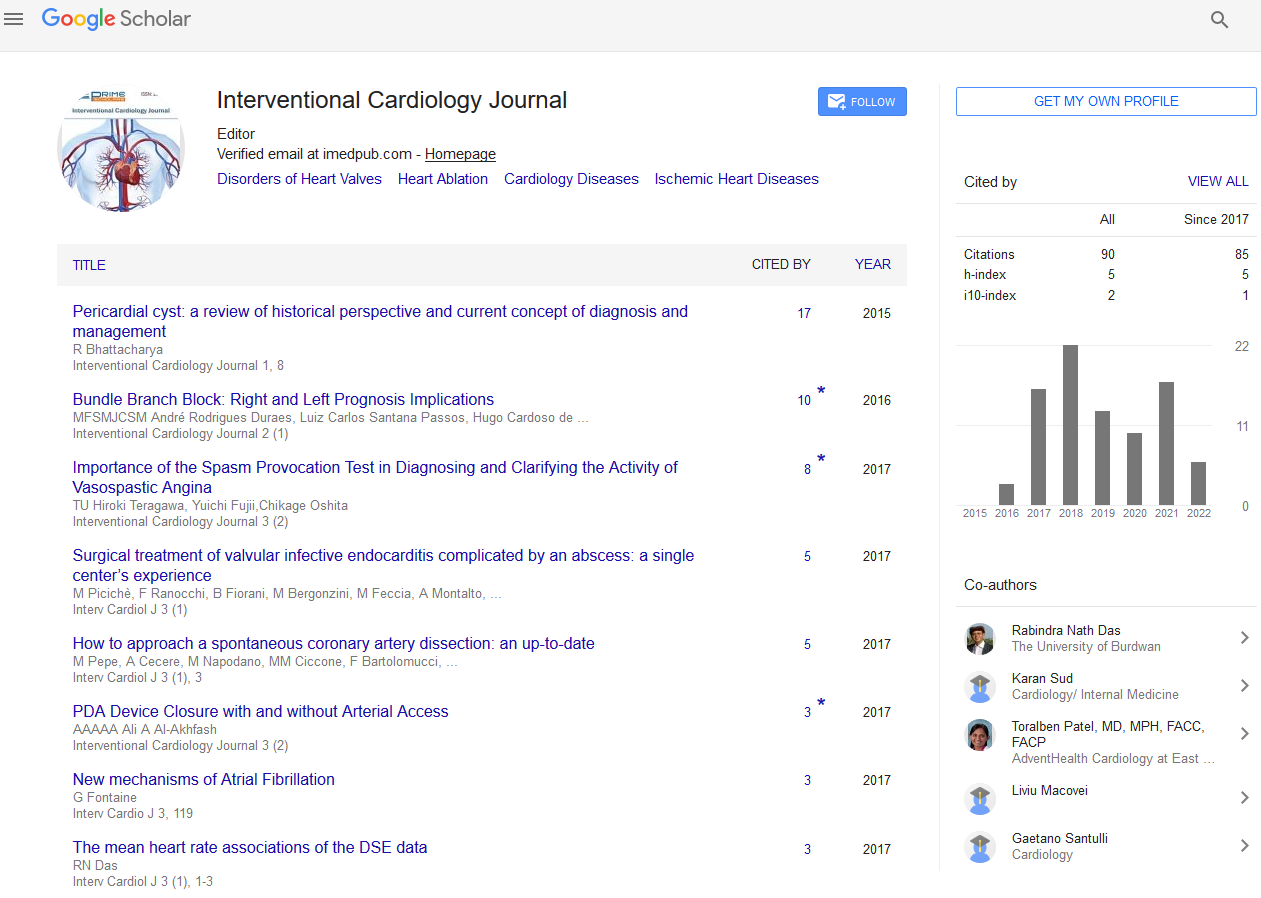Sanjay Kumar*
Burnett School of Biomedical Sciences, University of Central Florida, USA
*Corresponding Author:
Sanjay Kumar
Burnett School of Biomedical Sciences
University of Central Florida, USA
Tel: 407-266-7001
E-mail: Sanjay.Kumar@ucf.edu
Received: April 22, 2016; Accepted: April 28, 2016; Published: April 30, 2016
Stem cells have inherent property to proliferate and differentiate into varieties of cells thus have significant importance in cell based therapy. However, significant number of cells die once transplanted into ischemic myocardium because of unfavourable environment inside heart. Preconditioning with pharmacological drugs or with short cycles of hypoxia/anoxia followed by reoxygenation evokes endogenous protective mechanism against ischemic stress both in vitro and in vivo models and it may be therefore a necessary step to enhance their survival and proliferation upon transplantation into the infarcted heart.
Keywords
Stem cells have inherent property to proliferate and differentiate into varieties of cells thus have significant importance in cell based therapy. However, significant number of cells die once transplanted into ischemic myocardium because of unfavourable environment inside heart. Preconditioning with pharmacological drugs or with short cycles of hypoxia/anoxia followed by reoxygenation evokes endogenous protective mechanism against ischemic stress both in vitro and in vivo models and it may be therefore a necessary step to enhance their survival and proliferation upon transplantation into the infarcted heart.
Ischemia/reperfusion (IR) initiates various cellular and molecular changes often resulting in myocardial infarction and cardiac dysfunction. Inhibition of enzymes that are involved in cell pathology could be potential therapeutic targets especially . Pharmacological preconditioning (PC) with tadalafil, a PDE5A inhibitor enhances protein kinase G-1 (PKG-I) activity resulting in stem cell survival and cardioprotection. PC protection has two different phases, an early (2 h) and late (24 h). However, the mechanism of protection during these phases remained grossly unknown. Mesenchymal stem cells (MSC) from adult male Fischer-344 rats were pre-treated with tadalafil (100 μM) for an hour and subjected to 2 h of hypoxia (1% O2) followed by reoxygenation (HR: in vitro model mimicking ischemia/reperfusion). We observed (1) increased MSC survival with reduced cell cytotoxicity as revealed by low LDH release and trypan blue staining respectively in tadalafil treated cells upon HR; (2) decrease in TUNEL positivity as well as caspases activity ; (3) an increase in pAKT/AKT, iNOS, eNOS and pGSK3β/GSK3β during early protection phase of PC. This protection seemed to be a spontaneous adaptive response of MSCs against HR and was independent of tadalafil whereas an increase in Bcl2/Bax was tadalafil dependent; (4) during late phase, we observed phosphorylation of STAT3 at serine727 leading to its entry inside the nucleus and binding onto the promoter of PKG-I by 3 fold (P<0.05). In conclusion, an increase in Bcl2/Bax during early phase and transcriptional upregulation of PKG-I by STAT3 during late phase were responsible for stem cell protection by tadalafil against ischemic injury.
Signal transducer and activator of transcription 3 (STAT3) is known to induces various cardio protective genes contributes for late phase protection upon PC. We later tested the hypotheses that, does STAT3 has role to play in tadalafil induced cardioprotection during late phase of protection against ischemic injury in vivo.
To prove the above theory we generated heart specific conditional knockout mice by breeding STAT3fl/fl mice with tamoxifen inducible MCM transgenic mice. MCM transgene was cloned downstream to heart specific myosin heavy chain (MHC) promoter. Cre positive mice with MCM:STAT3fl/fl genotype were selected and tamoxifen (20 mg/kg) was administrated for continuous 10 days. Mice were then treated with tadalafil (1 mg/kg) before IR surgery. IR model been made by ligating left anterior descending (LAD) coronary artery for 30 min followed by reperfusion. We observed (1) Complete knockdown of STAT3 from mice heart. Echocardiographic analysis revealed improved fraction shortening with no significant change in cavity size, anterior and posterior wall with tadalafil after 24 h of IR injury whereas complete abrogation of cardioprotection was observed in STAT3 knockouts compare to non-transgenic mice.
Conclusion
The cardioprotection was observed by pharmacological preconditioning with tadalafil during the late phase against IR. This protection was via STAT3 signalling pathway dependent induction of PKG-I.

